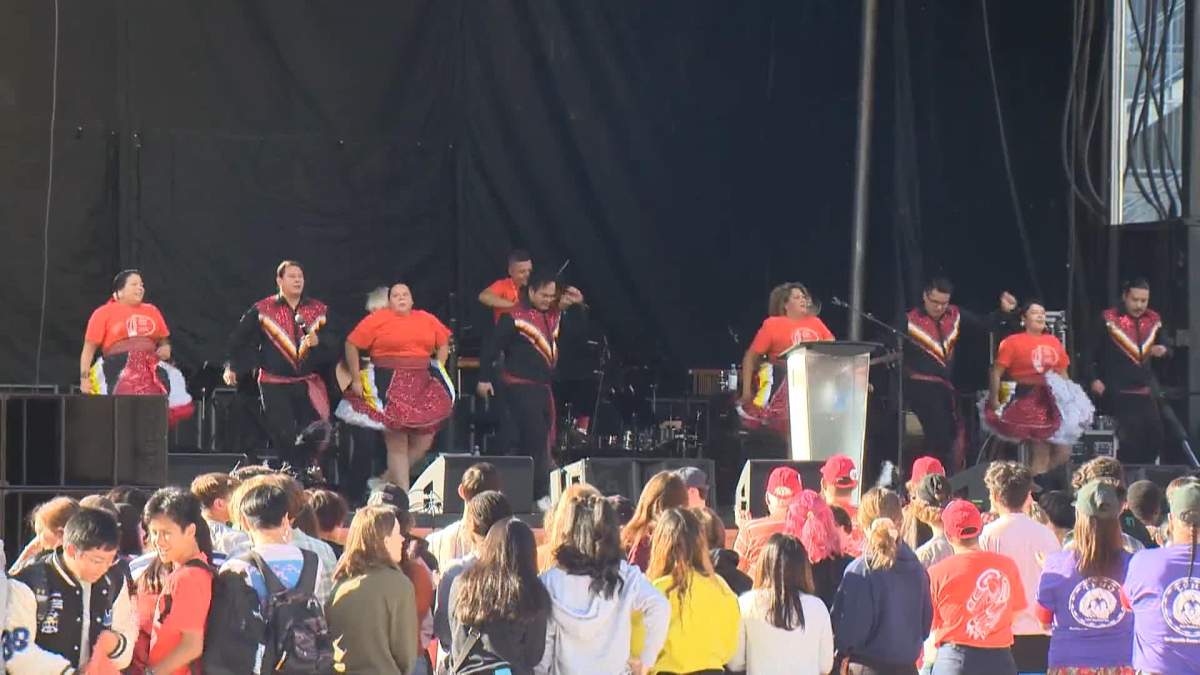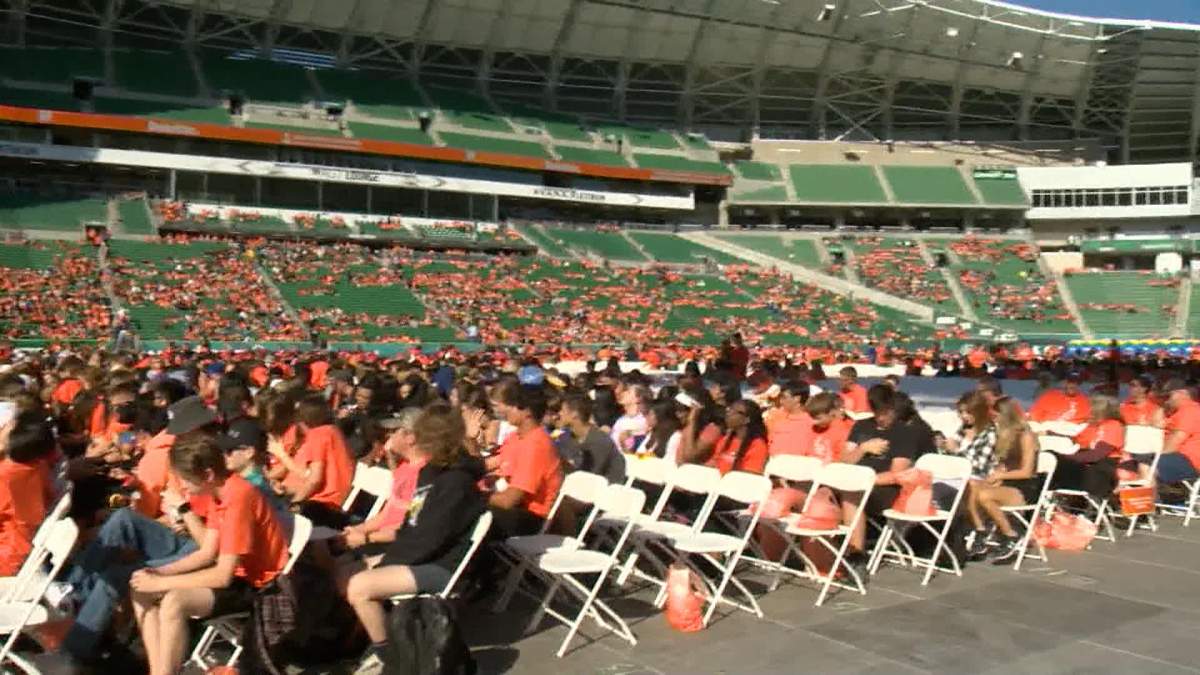The Miyo-wîcîwitowin Day was held at Mosaic Stadium in Regina on Thursday, bringing thousands of students to the stadium to educate them ahead of the National Day for Truth and Reconciliation on Friday.

Howie Thomson from Carry the Kettle Nakoda First Nation opened and MC’d the event, introducing the Creeland Dancers.
Before they started dancing, Amy Seesequasis from the group said the Creeland Dancers are made up of people from different First Nations and Metis communities.
“Here we are today honouring residential school survivors and those that did not make it home. And here we are being good treaty partners today, and we’re having an act of reconciliation, recognizing we all have a shared history, that we all have our own cultures, worldviews, languages, religions, and that they all have space here,” Seesequasis said.
Other artists danced and sang throughout the event, but Thomson took a moment to tell his story.
“I’m a survivor. I’ve been there. I’ve been through the fire,” Thomson said.
“No one should harm a child. Every child matters.”
He said he’ll never forget the year he was taken in 1965 when he was five years old, and that was why he was wearing a Calgary Hitmen jersey with the number 65 on it.
He said the jersey was a gift from some of the people at Siksika Nation in Calgary, who agreed with him that there was value in humour, prayer, and belief in who you are.
Chief Cadmus Delorme from Cowessess First Nation took the stage, and spoke about how important today’s generation was.
He said kids today were the drivers for teaching the truth about Canada’s past, and about reconciliation.
“When we learn the truth, just remember that everybody is on a different journey to understanding the truth,” Delorme said.

Get daily National news
He added not everyone was taught the truth in school.
Another speaker at the event was Gov. Gen. Mary Simon, who had just visited James Smith Cree Nation the day before.
“Education is the key to reconciliation. We must learn about each other, to reach out to different cultures, Indigenous and non-Indigenous alike. And it is our shared responsibility to record and teach the true history of Canada,” Simon said.
She said growing up, she was punished for speaking her Inuit language, but said today kids can go to school in their own communities and learn about their culture and language.
“Together, let’s engage with the diverse communities that make up our country to create a nation where all young people can take control of their destinies, where they can be who they are, free from judgment.”
Chief RoseAnne Archibald from the Assembly of First Nations took the stage, reinforcing the importance of youth today.
“It’s really inspiring to look out and see so many youth, and survivors, and intergenerational trauma survivors gathered here in the spirit of togetherness, understanding and the healing path forward,” Archibald said.
She added this sets the stage for a safe environment where First Nations and Indigenous people can heal and move forward.
“The time has come for us to move from being survivors to thrivers. And that is your legacy as young people, to move from being survivors to thrivers.”
“There was an era of church-run and government-funded Indian residential schools, but I don’t call them schools anymore. I was the first in my family to not have to attend one of these institutions. And I went to many schools across Ontario, and not one of them had unmarked graves with children buried in them,” Archibald said.
She noted we see the reverberations of these institutions across communities, whether it be someone on the street suffering from mental health issues and addictions, or the tragedy at James Smith Cree Nation.
She added that kids today have the power to change the world.
“It’s often young people who have the courage to take that action that will lead to positive change.”
Archibald ended by saying that we need to enact all 94 calls to action from the Truth and Reconciliation Commission.
Ted Quewezance, former chief of the Keeseekoose First Nation, spoke about understanding, and how we need to start understanding before we judge.
“Every time you see a report on the news regarding a First Nations person, or a community, you are directly involved in residential schools,” Quewezance said.
He said he was taken away to a residential school when he was five years old.
“I was physically, I was emotionally and sexually abused in that institution,” Quewezance said.
“The federal government and the churches did this.”
He said the colonial policy seen in residential schools was seen during the ’60s scoop, as well as foster care today.
Erica Beaudin, executive director of the Regina Treaty Status Indian Services, said she had many family members involved in residential schools, and said she was a day school survivor herself.
“Residential schools are not only Indigenous history, or only church and government history. Residential schools are Canadian history,” Beaudin said.
She added each one of us has the opportunity to make Canada the best it can be.
Edmund Bellgarde, president and CEO of File Hills Qu’Appelle Tribal Council also spoke, and talked about his family, who have suffered through residential schools.
He said his grandfather was taken from his family when he was three years old, and that his great grandparents didn’t see their son until he was 14.
He said he grew up with a lot of shame for being Indigenous.
“Today gives me hope. Hope can only come when change is possible,” Bellgarde said.
“Reconciliation is about making the circle bigger. It’s not about making Indigenous people fit in to Canada, it’s about making that space bigger.”
He added understanding how we are all different, and bringing those differences together, can make things better for everyone.
Mayor Sandra Masters also took the stage with a number of city councillors to make an announcement.
They announced the Seat of Truth, an orange seat in the stands that will act as a legacy piece for Mosaic Stadium.
“Our Seat of Truth will always remain unseated and unsold. It will remain available for the spirit of those who do not get the opportunity to witness our world today,” said Masters.













Comments